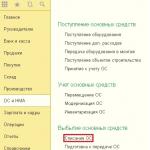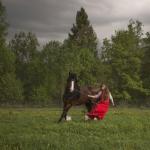Addition
Addition - this is a minor member of the sentence that answers questions of indirect cases and denotes the object (subject) to which the action is directed or associated or (less often) in relation to which a qualitative attribute is manifested. Sometimes addition denotes the subject of an action or state (see translation agency). For example: The old man was catching fish with a seine (A. Pushkin); He was not at all inclined to humility and meekness (K. Chukovsky); I can’t sleep, there’s no fire... (A. Pushkin).
Add-ons, expressing the object of action, are used with verbs, as well as with nouns formed from them: deliver goods- cargo delivery; work on an article- working on the article.
Add-ons, naming an object in relation to which a qualitative attribute is manifested, are used with adjectives and nouns formed from them: faithful to duty- loyalty to duty; stingy in his movements- stinginess in movements.
Add-ons are divided into straight And indirect.
Direct addition - This addition, which depends on a transitive verb and is expressed by a noun or pronoun (as well as any part of speech used in the meaning of a noun) in the accusative case without a preposition: see picture, sing a song, fix the iron , write a letter , solve a problem , seehis , meet a friend .
Direct addition can also be expressed by a noun in the genitive case without a preposition. The genitive case is used instead of the accusative in two cases: 1) if there is a negative particle Not before transitive verb: felt joy- did not feel joy; heard voices- did not hear voices; 2) if the action does not transfer to the entire object, but only to a part: bought bread- bread; drank water- water: ...The gun commander did not leave the firing position, he asked to bring him shells from the broken guns (V. Astafiev); Don’t sing, beauty, in front of me you sing the songs of sad Georgia... (A. Pushkin).
Direct addition denotes an object to which an action is directly directed, which can arise, be created or disappear, or be destroyed during the action: knit a sweater,write an essay, decorate a room, check a dictation, break a tree, demolish a house etc.
Everyone else additions are indirect, they express different relations of action or attribute to objects: I won't regret it about roses, withered with a light spring (A. Pushkin); Aksinya remembered her youth and all her life, poor in joys (M. Sholokhov).
Add-ons can be expressed:
1) a noun in any indirect case with or without a preposition: With a golden ray the villagelilo (A. Maikov);
2) pronoun: I could never argue with them(M. Lermontov);
3) cardinal number: Divide thirty-six by two;
4) any part of speech in the meaning of a noun: I ran to my grandmother and asked her about the forgotten (M. Gorky);
5) infinitive: Everyone asked her to sing something (M. Lermontov);
6) syntactically integral phrases and phraseological units (the same as the subject): Hunters killed seventeen snipe (L. Tolstoy).
– is the person or thing towards which the action is directed. The object is found after the verb or the combination “verb-link + adjective”:
- After the verb: I see you. - I see you.
- After a linking verb + adjective: I am afraid of you. - I'm afraid of you.
Direct object in English
Direct object(direct object) is the object to which the action is directed. A direct object can be added without a preposition:
I love this game. – I love this game.
I believe you. - I believe you.
We learn languages. – We learn languages.
Also direct object can be joined using a preposition (prepositional object).
I'm talking to you. - I'm talking to you.
He is proud of you. - He's proud of you.
Prepositions between a verb and an object are a stumbling block, and not only for beginners. Here you cannot rely on the patterns inherent in verbs and prepositions in the Russian language. It often happens that in the Russian version a preposition is needed, but in English it is not, or vice versa.
A cat climbed the tree. – The cat climbed ON tree.
Don't listen TO him– Don't listen to him.
To quickly remember which preposition comes after which verb, pay attention to the context when learning verbs. Consider that “verb + preposition” is a whole word with its own meaning, and the same verb + another preposition is another word. For example:
- Talk about something- talk about something
Let's talk about art. - Let's talk about art.
- Talk to somebody- talk to someone
Talk to my boss. - Talk to my boss.
In addition, practice helps to cope with the “verb-prepositional” problem (as with any other problem). The more you read and listen, the more combinations you remember, the easier you understand and use them.
Indirect object in English
Both in English and Russian there are verbs that require not only a direct object, but also an indirect one - an object to which the action is directed through a direct object.
Let's take the verb tell- talk, tell. This action can be directed to a single object - a direct object:
Jane is telling a fairy-tale. - Jane is telling a story.
But often the action tell is aimed at two objects - one directly, the other indirectly, through the first, it answers the question “to whom?” note that indirect object is between the verb and the direct object.
Jane is telling me a fairy-tale. Jane is telling me a story.
An indirect addition cannot do without a direct one. Even if there is no direct object in the sentence, it is implied, unspoken:
He told me... - He told me... (possibly told “everything” or “the truth”)
As a rule, verbs that fit into the logical scheme of “doing something to someone” have two objects – indirect and direct – for example: show- show, explain– explain, give- give. Moreover, the direct object is usually some object, and the indirect object is a person.
He showed you his city. – He showed you his city.
Give us your phone, please. - Give us your phone number, please.
She passed Jack a slice of pizza. – She handed Jack a piece of pizza.
Indirect object after direct
In many cases, an indirect object can be placed after a direct object, then a preposition will be needed before it to(indirect prepositional object):
He showed his city to you. “He showed you his city.”
Give your phone to us, please. – Give us your phone number, please.
She passed a slice of pizza to Jack. – She handed a piece of pizza to Jack.
A number of verbs allow only this option of addition, for example: prove- to prove, explain– explain, repeat- repeat.
- Right: Repeat the word to me. - Repeat the word to me.
- Wrong: Repeat me the word. – Repeat my (?!) word.

Direct addition Addition expressed by form accusative case without preposition and dependent: a) from a transitive verb (write a statement, give advice); b) from some words of the condition category (sorry for the girl, it hurts her arm). Form genitive case can act as a direct object: a) with transitive verbs with negation (not to like music, not to notice mistakes); b) with some words, categories of state (sorry for lost time).
Dictionary-reference book of linguistic terms. Ed. 2nd. - M.: Enlightenment. Rosenthal D. E., Telenkova M. A.. 1976 .
See what a “direct complement” is in other dictionaries:
See oggetto diretto... Five-language dictionary of linguistic terms
direct addition Dictionary of linguistic terms T.V. Foal
direct addition- A type of morphologized addition used with transitive verbs and denoting the object to which the action is directly directed and which is completely covered by the action. D.p. expressed: 1) accusative case without... ... Syntax: Dictionary
Addition- Complement is a member of a sentence, expressed by a noun and denoting an object (object), reflecting the action of a verbal attribute or serving as its instrument. There is a distinction between direct and indirect objects. Direct object means... ... Linguistic encyclopedic dictionary
ADDENDUM, additions, cf. (book). 1. Action under Ch. complement complement. He was involved in adding and correcting old articles for the collection. || A part added to clarify or correct what was previously written. In the new circular... ... Dictionary Ushakova
STRAIGHT, oh, oh; straight, straight, straight, straight and straight. Ozhegov's explanatory dictionary. S.I. Ozhegov, N.Yu. Shvedova. 1949 1992 … Ozhegov's Explanatory Dictionary
ADDITION, I, Wed. 1. see add. 2. What n. added, addition. D. to the resolution. In d. (in addition to nothing else). Additions to clothing (ties, belts, scarves, bags, jewelry). 3. In grammar: minor member of a sentence... ... Ozhegov's Explanatory Dictionary
This term has other meanings, see Appendix. An addition in syntax is a minor member of a sentence, expressed by a noun or pronominal noun. Supplement denotes a thing or person that is the object of... ... Wikipedia
Complement (syntax) is a minor member of a sentence, expressed by a noun or pronominal noun, which names the person or thing that is the object of the action called the predicate. There is a direct object without a preposition... ... Wikipedia
Books
- Periodic law. Additional materials, D.I. Mendeleev. This book will be produced in accordance with your order using Print-on-Demand technology. This volume is a kind of addition to the volume of works by D. I. Mendeleev on...
A complement is a minor member of a sentence, denoting the object to which the action is directed, which is the result of the action or its instrument. The addition answers questions about indirect cases.
Additions are usually expressed by nouns and pronouns: Yegorushka looked (at whom?) at the sentries (Ch.); The heat and the boredom of the steppe tired (who?) him (Ch.). In addition, additions can be expressed by any part of speech that can be used in the meaning of a noun. For example: by participle - Let's forget what happened between us (G.); adjective - Both then we chatted empty air (N.); interjection - Varka lies on the stove, does not sleep and listens to her father’s “boo-boo-boo” (Ch.). The addition may be an indefinite form of the verb: Koldoba ordered the partisans to disperse into the catacombs and not to stay in crowds (Paust.) - and an indecomposable phrase: I have seen many countries, walking with a rifle in my hand (Isak.).
An object is called direct if it refers to a transitive verb and is in the accusative case without a preposition. For example: Deniska decisively took (what?) the pie (Ch.).
An object is also considered direct in the genitive case if it stands with a verb with a negation: But do not return today's past (N.) - or denotes part of the object to which the action is directed: The boy drank milk (cf.: The boy drank milk).
All other additions, that is, additions expressed by all indirect cases and accusative with prepositions, are called indirect. For example, the Fishermen shook their heads in surprise (Paul); ... Sophia began to tell her mother about her revolutionary work (M. G.).
Exercise 520. Rewrite. Find the additions and determine how they are expressed. What kind of additions are these - direct or indirect?
1. Large, fluffy snow was falling and painted the pavement, horse backs, and cab drivers’ hats white (Ch.). 2. Kashtanka ran back and forth and did not find her owner (Ch.). 3. She [Kashtanka] smelled the stranger’s clothes and boots and found that they smelled very much like a horse (Ch.). 4. She [Kashtanka] saw something unexpected and terrible (Ch.).
- Yashka hammered in the racks for the boiler with a stone, and Dergach himself cleared the crossbar of branches (Hyde.). 6. Throwing off his overcoat, he took a crowbar from under the cart and called the guys (Bab.). 7. Sergei spoke about the construction of the power plant and the electrification plan (Bab.). 8. What is written with a pen cannot be cut out with an ax (ate). 9. Valentina understood Andrei better than himself (G. Nik.).
1. Satisfied with the festive dinner, the neighbor sniffles in front of his neighbor (P.). 2. Flowers are the last mile of the luxurious firstborn of the fields (P.).
- Just once Pechorin persuades me to go wild boar with him (L.).
- She [Kashtanka] remembered Luka Aleksandrovich, his son Fedyushka, a cozy place under the workbench... She remembered that on long winter evenings, when the carpenter was planing or reading a newspaper out loud, Fedyushka usually played with her (Ch.). 5. I return Gorlenko’s letter with a big thank you (Ch.). 6. At such moments he became unattainable, to match the majestic portraits of Franklin and Lomonosov (Gran.).
1. [The sea] breathed a damp salty aroma and sounded affectionately, splashing against the sides of the ships, on the shore, slightly rocking the boat Chelkaiya (M. G.). 2. And all the birds sang, and everyone felt so at ease, everyone felt that a passionate desire for life and happiness was born in their hearts (M. G.). 3. Far beyond the sea, at sunrise, there is a country of a big river... (M.G.). 4. Oleinik received a hand-knitted sweater and gloves (Bub.). 5. Every morning we went to the rise of the destroyer (Paust.).
- He proved that flooding the catacombs does not produce results (Paust.).
- Before the start of the morning meeting, Krylov was called to the long-distance telephone (Gran.).
Sample. A memory (of whom?) of a friend (cf.: to remember a friend); shadow (what?) from the fire; sandwich (which one? and with what?) with sausage.
A song about a bird, a story about youth, thoughts about life, a thought about a grandson, memories of a village, words about spring, a shadow from the shore, hope for earnings, a rope of straw, a shot from a revolver, pyramids made of plywood, an overcoat made of cloth, a basket of coal, a stained face, a sandwich with cheese, the beat of a drum, a word for the soul, parking places, fear of fate, work on the construction of a harbor, work on raising a boat.
In the Russian language, all words that are part of sentences are either main members or secondary ones. The main ones constitute and indicate the subject being discussed in the statement and its action, and all other words in the construction are distributive. Among them, linguists distinguish definitions, circumstances and additions. Without minor members of the sentence, it would be impossible to talk about any event in detail without missing a single detail, and therefore the importance of these members of the sentence cannot be overestimated. This article will discuss the role of the complement in the Russian language.
Thanks to this member of the sentence, it is easy to construct a complete statement in which not only the action of the main character of the story will be indicated, but also the object with which this very action is connected will be highlighted. So, in order not to get confused, you should start analyzing this topic from the very beginning. After all, only by following consistency can you learn the great and powerful Russian language.
Definition
A complement is a minor member of a sentence that indicates an object that is the result of the action of the main person in the sentence or to which this action is directed. Can be expressed as follows:
- A personal pronoun or noun used in indirect case forms. Can be used in a sentence with or without a preposition (I listen to music and think about him).
- Any part of speech that performs the function of a noun (She glanced at the people who entered).
- Often additions in Russian are expressed by the infinitive (Parents asked her to sing).
- A free phraseological combination of a noun and a numeral, used in the genitive case (He opened six tabs.).
- A connected and stable phraseological combination (He said not to hang your nose).
Function and addition issues
In Russian, the addition responds to cases, namely: “Whom?”, “To whom?”, “Whom?”, “About whom?”, “What?” “What?”, “What?”, “About what?” In a sentence, this minor member has an explanatory function and can refer to the following parts of speech:

- To a verb used as a predicate (I am writing a letter).
- To a noun as any member of a sentence (Hope for the father).
- To a participle or adjective used as any member of a sentence (Weighing grain; strict to daughter).
- To an adverb as any member of a sentence (Unbeknownst to you).
Types of add-ons
If a given member of a sentence depends on a verb, then it can be of two types:
- Direct objects in Russian are used without prepositions and are expressed by transitive verbs in Such words denote an object to which, one way or another, the action of the main person relates. For example: I remember very well the day we met. If the predicate in a sentence is a transitive verb and is in the form of negation, then a direct object in the genitive case can be used with it without a preposition (But we can’t bring back the days of yore). In the case of impersonal predicative words in a sentence, the addition is also used in the form of the genitive case and without a preposition with the words “sorry” and “sorry” (And we feel sorry for something bright).
- Indirect objects in Russian are expressed by words in the form of the accusative case, used together with prepositions, and in others without prepositions (She jumped up and began to peer out of the window with a restless look; his attempts to improve relations with his classmates were crowned with success).

Meanings of direct objects
Direct objects in Russian, used with verbs, can denote the following objects:
- An item obtained as a result of the action (I will build a house in the village).
- An object or person that is exposed to action (Father caught a fish and brought it home).
- An object to which the feeling is directed (I love winter evenings and walks along a snowy street).
- Object of development and knowledge (She knew foreign languages and could communicate freely; she was interested in philosophy and foreign literature).
- The space that is overcome by the main person (I will go around the entire globe, cross the cosmic distances).
- Object of desire or thought (Now I remember it).
Meanings of indirect objects without prepositions
An indirect object in Russian, used without prepositions, can have the following meanings:
- The relationship of the objects referred to in a phrase or sentence, namely the object to which the action is directed (Harvested).
- Object of achievement or touch (Received his diploma today; he will be happy when he touches just her hand).
- An object with which an action is performed (You can’t cut out what’s written on your heart with an ax).
- A subject or state that complements the action (The bear he killed was very large; he should be sorry).

The meaning of indirect objects with prepositions
Indirect additions, which cannot be used in a context without prepositions, in a sentence can acquire the following shades of meaning:
- The material from which this or that object is made (The house is built of stone).
- The object that is affected (Waves splashing on the stone).
- The person or thing that is the cause of the condition (The father was worried about his son).
- An object to which thoughts and feelings are directed. (He talked about the benefits of his work.)
- The object from which is removed (It is in early age left his father's house.).
- The person who participates in the main action (Upon arrival, the grandchildren surrounded the grandmother and kissed her for a long time.).
Addition as part of turnover
In the Russian language there are such concepts as active and passive phrases. In both cases, this is a special phrase, the construction of which includes the main and considered secondary members of the sentence.
A turnover is considered valid in the case when the addition is the person to whom the action is directed, and main member sentences are expressed by a transitive verb. For example: picked a bouquet, mowed the lawn.

Passive is a turn in which the basis is the subject undergoing action, and the complement indicates the main object of the statement. For example: the colonel was quickly picked up by the privates and sent to the infirmary.
How to find an addition in a sentence?
Questions of addition in Russian are very simple, and therefore, regardless of what part of speech a given member of a sentence is expressed, finding it in the context is not too difficult. To do this, you should follow the standard parsing scheme. First, highlight the grammatical basis, and then determine the connection of words in a sentence through the questions posed. First, from the subject and predicate to the secondary members, and then directly between the secondary members. In writing, each word, depending on which category it belongs to, is indicated by a special type of underlining. To complement this

Secondary members of a sentence are the basis of complete statements
Secondary members of a sentence are a fairly voluminous topic and contain many rules, but if you do not spend a sufficient amount of time studying it, you will not be able to master such a great science as the Russian language. Circumstance, addition and definition are those that will allow you to form a statement that reveals the entire meaning of the story. Without them, the language would lose all its charm. Therefore, it is very important to approach this topic with full responsibility in order to know how to correctly use this or that word in context.




